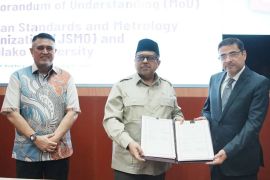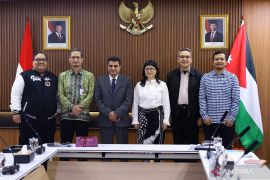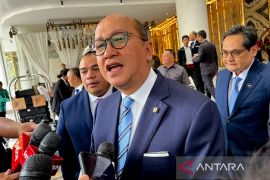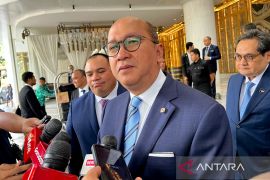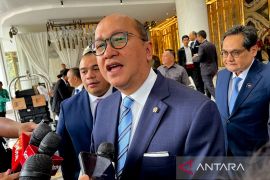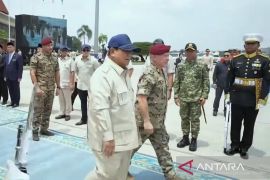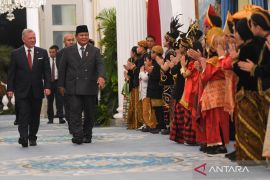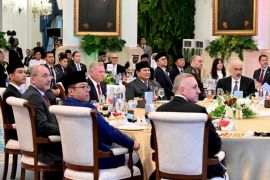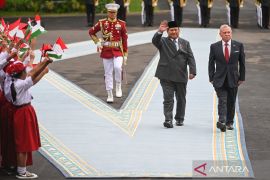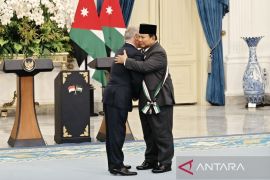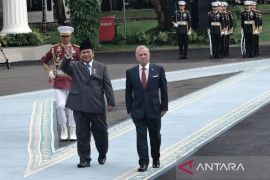"The bilateral relations are unique. In trade relations, we complement each other. For instance, we have potash and phosphate, and Indonesia has wood and palm oil," Ambassador Walid noted here on Thursday, while speaking on the occasion of the 68th aJakarta (Antara News) - The bilateral relations between Indonesia and Jordan are very sound and complement each other, stated Jordanian Ambassador to Indonesia Walid Al-Hadid.
"The bilateral relations are unique. In trade relations, we complement each other. For instance, we have potash and phosphate, and Indonesia has wood and palm oil," Ambassador Walid noted here on Thursday, while speaking on the occasion of the 68th anniversary of Jordans Independence.
Indonesia and Jordan are moderate and tolerant Muslim-majority countries where different ethnicities and religious followers live peacefully and in harmony, he added.
In February 2014, Jordans King Abdullah II ibn Hussein paid a two-day visit to Jakarta, which was his second visit to Indonesia during the Yudhoyono administration. His first visit was in October 2005, after which, Yudhoyono made a reciprocal visit to Jordan in May 2006.
Both Jordans King Abdullah II ibn Hussein and Indonesias President Susilo Bambang Yudhoyono have been very active in promoting interfaith dialogs, particularly between Muslims and Christians, to bring peace and harmony in the world.
During his visit to Jakarta, on February 26, 2014, King Abdullah II delivered a key note address at an interfaith peace conference titled "Islam for Peace and Civilization" organized by Indonesias largest Muslim organization, Nahdlatul Ulama (NU). In his speech, the King highlighted the role of Islam in achieving renaissance in the Muslim world, despite the challenges it has been facing and the Islamic values of tolerance, justice, and equality.
Currently, Indonesia is Jordans biggest trade partner in Southeast Asia with two-way trade value reaching more than US$475 million in 2013. Indonesian exports to Jordan comprise, among others things, wood and wood-based products, textiles and garments, palm oil, furniture, tea, and coffee. Meanwhile, the products that Indonesia imports from Jordan include potash, phosphate, salt, and products from the Dead Sea.
In the field of investment, data from the Indonesian Investment Coordination Board (BKPM) showed that Jordan realized US$232.9 million worth of investment in eight projects in Indonesia last year.
Indonesian state-owned fertilizer producer PT Pupuk Kalimantan Timur (PKT) and Jordan Phosphate Mines Co. Plc (JPMC) have agreed to build four plants worth US$300 million to produce phosphoric acid and sulfuric acid in Bontang, East Kalimantan. Two of the plants are expected to commence construction by mid-2014 and are slated for completion in three years.
Ambassador Walid Al-Hadid remarked that Jordan and Indonesia were currently planning to sign cooperation agreements related to religious tourism and education.
Jordan has several important religious sites for both Muslim and Christian pilgrims. Walid Al-Hadid encourages more Indonesians to visit his country. Last year, around 50 thousand Indonesian tourists visited Jordan.
"More Indonesians should visit Jordan and stay there for a longer period of time. They can obtain visa on arrival or apply for visa at the embassy," the ambassador emphasized.
Jordan has tombs of many companions of the Prophet Muhammad who were martyred and buried there. The Prophets companions include Zeid ibn al-Haritha, who was the Prophets adopted son, Jafar bin Abi Talib, cousin of the Prophet and elder brother of Ali, Abu Ubaydah Amer Ibn al-Jarrah, Muath bin Jabal, Shurhabil bin Husna, and Dirar bin al-Azwar, a great general.
Among the important Biblical sites in Jordan is Bethany Beyond the Jordan, which was the site of John the Baptists settlement and where Jesus was baptized on the east bank of the Jordan River. Some of the worlds earliest churches are found in Jordan, including the second and third century prayer hall at Bethany Beyond the Jordan, the fourth century church at Umm Qays, and the remains of the worlds oldest purpose-built church at Aqaba. (*)
(T. F001/INE)
Reporter: Fardah
Editor: Fardah Assegaf
Copyright © ANTARA 2014
